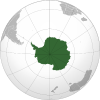Hamilton Cliff
Hamilton Cliff (85°1′S 90°18′W / 85.017°S 90.300°WCoordinates: 85°1′S 90°18′W / 85.017°S 90.300°W) is an imposing rock cliff that rises more than 600 metres (2,000 ft) and forms the northeastern extremity of the Ford Massif, in the Thiel Mountains of Antarctica. The name was proposed by Peter Bermel and , co-leaders of the United States Geological Survey (USGS) Thiel Mountains party which surveyed these mountains in 1960–61, and the cliff was named for Warren B. Hamilton, USGS representative in charge of geologic studies in the McMurdo Sound dry valley area, 1958–59.[1]
References[]
- ^ "Hamilton Cliff". Geographic Names Information System. United States Geological Survey. Retrieved 2012-05-18.
![]() This article incorporates public domain material from the United States Geological Survey document: "Hamilton Cliff". (content from the Geographic Names Information System)
This article incorporates public domain material from the United States Geological Survey document: "Hamilton Cliff". (content from the Geographic Names Information System)
- Cliffs of Ellsworth Land
- Ellsworth Land geography stubs
 WikiMiniAtlas
WikiMiniAtlas